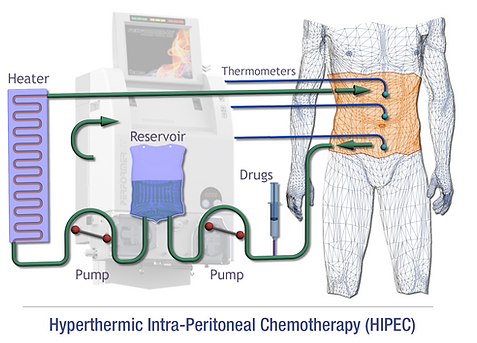Dr. Rani Bhat is a highly experienced surgeon specializing in peritoneal cancer management. With a proven track record of successful cases, she is dedicated to providing the best possible care to her patients. Dr. Rani received specialized training at the prestigious National Cancer Center in Singapore, focusing on peritoneal cancer management and HIPEC. Her expertise and commitment to her patients set her apart from the rest. Get to know Dr. Rani Bhat and discover how she can help you in your journey towards better health.
Primary Peritoneal Cancer

Tummy is like a hallow organ and this is lined by a thin layer of tissue which is kind of transparent and is called the peritoneum, which covers and protects the internal organs.
Peritoneal cells are the same as the ovarian cells that’s because the peritoneum and the surface of the ovary come from the same tissue when we develop from embryos in the womb.
Primary peritoneal cancer, ovarian cancer, and fallopian tube cancer have similar clinical presentations and treated the same.
What are the causes?
-
Risk increases with age
-
Obesity or being overweight increases your risk
-
If there is a family history of ovarian or breast cancer (genetic BRCA1 and BRCA2). 1% of ovarian cancers may be due to hereditary
-
Hereditary breast and ovarian cancer syndrome (HBOC): women with HBOC are characterized by a high risk of breast and ovarian cancers and they also tend to develop primary peritoneal cancer
-
Risk is slightly higher in women who have not had children and in women who have had early menarche (first menstruation) and late menopause
What are the symptoms?
-
Pain in the tummy
-
Swollen abdomen
-
Feel lump in your tummy
-
Feeling full even with small meals
-
Loss of appetite
-
Loss of weight
-
Frequency of passing urine
-
Constipation
-
Heartburn
What tests will be required for diagnosis?
-
To confirm the diagnosis:
-
The doctor will usually do a vaginal examination (internal examination) if you have symptoms that may possibly be like cancer.
-
-
Assessing the extent and spread:
-
Further tests may be advised to assess if cancer has spread to other organs such as, an ultrasound scan, a CT scan, PET CT an MRI scan, a chest X-ray, blood tests like CA125, CEA, LDH, AFP, beta HCG tumor marker or other tests.
-
-
If your tummy is swollen with fluid (called ascites) of mass, you may be advised to have this fluid drained or have a biopsy of the mass. This is usually done with the help of ultrasound (ultrasound guidance). The removed fluid or biopsy of the mass may be checked for cancer cells.
-

_b.png)
What are the treatment options?
Surgery :
-
Surgery is the mainstay of treatment. The type of surgery will depend on the stage of cancer and the age of the patient.
-
The guideline is to remove womb with the cervix (total hysterectomy), both ovaries and fallopian tubes (bilateral salpingo-oophorectomy), fatty apron near the stomach (omentum) and fatty tissue (lymph glands) and to remove all the visible tumor, this surgery is known as cytoreductive surgery (CRS). There are various surgical treatment for primary peritoneal cancer depending on the stage of cancer and other considerations. Aim of the surgery is – not gross tumor left behind.
-
HIPEC (Hyperthermic intra-peritoneal chemotherapy): is an intra-operative procedure which may be offered on a case to case basis. The principle of this procedure is that after complete removal of the tumor the tummy is washed with heated chemotherapy.


HIPEC
When the cancer is in advance stages, you may be advised to have neo-adjuvant chemotherapy (NACT) to shrink the tumor and then go for CRS this is sandwich therapy: neo-adjuvant chemotherapy
Chemotherapy
In chemotherapy treatment drugs are used to kill or slow the growth of cancerous cells. It’s usually given through an IV injection.

Follow-up after treatment
-
You should strictly follow-up with your doctor as per their advice.
-
In addition to receiving treatment for cervical cancer your success of treatment will depend only when you have regular follow-up.
Primary peritoneal cancer (PPC) is a rare cancer arising from the thin layer of tissue that lines the inside of the tummy (abdomen). Primary peritoneal cancer behaves exactly like ovarian cancer hence treated just like ovarian cancer.
When ovaries are normal and don’t show any cancer that has originated from the ovary but cancer noted on to the peritoneum then it is known as primary peritoneal cancer.
Where is peritoneum situated in the body?

